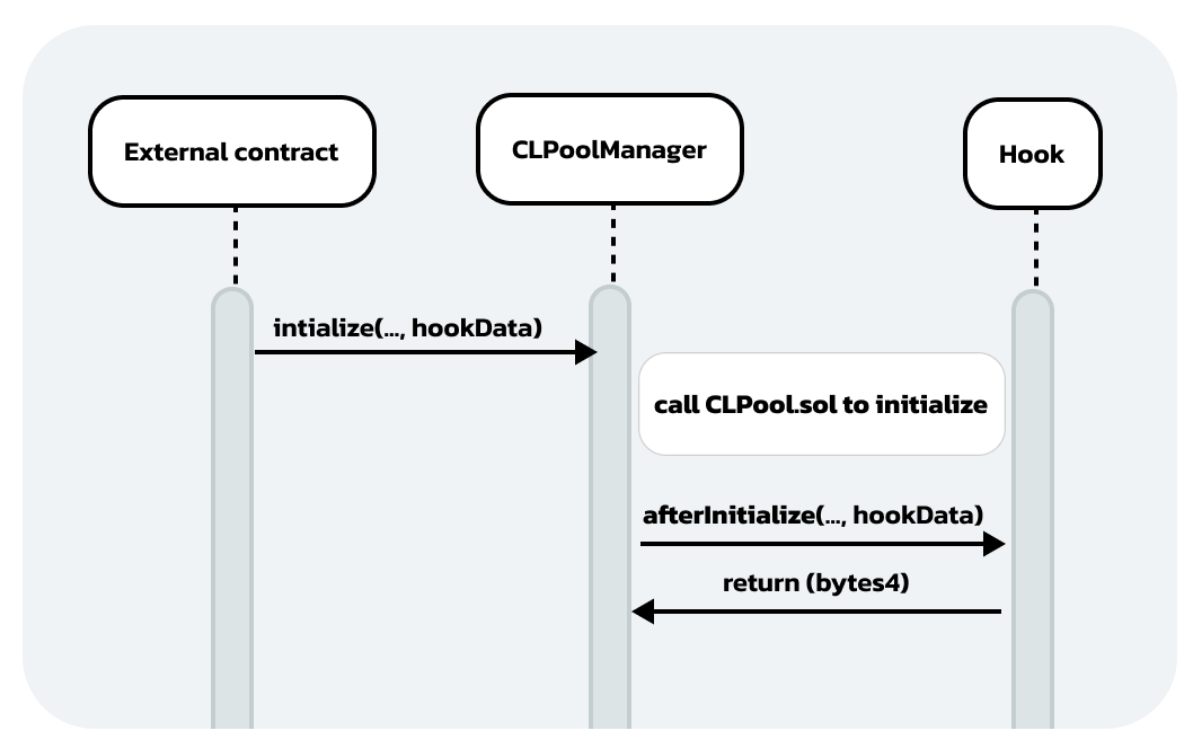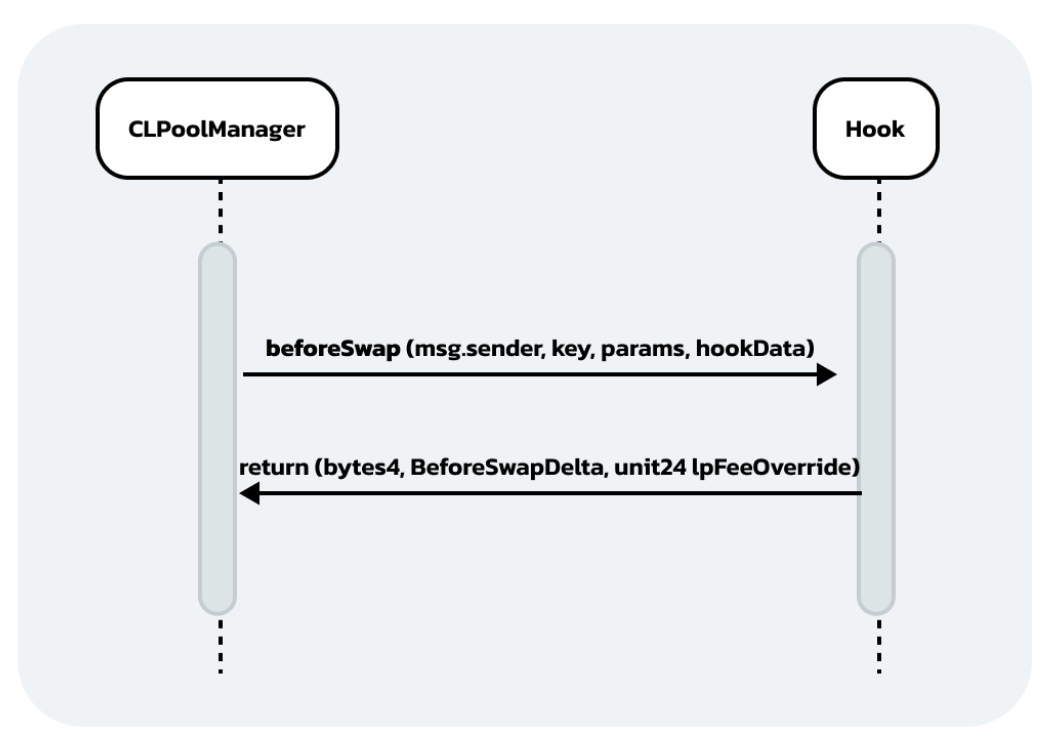Develop a hook - veCake Timestamp
Custom hooks in PancakeSwap V4 allow developers to add custom logic to key operations within the protocol, such as swaps, adding liquidity, and more. This guide will walk you through the process of creating and deploying custom hooks using the PancakeSwap V4 hooks template.
Below we'll demostrate how to develop a hook. Find out more about Pancake v4 hooks here. In this guide we'll develop a hook for for concentrated liquidity pool. The same step will apply for liquidity book. We'll start with introducing hook template before the step by step guide section.
Hooks template
Creating custom hooks in PancakeSwap V4 involves understanding and implementing various components provided in the hooks template.
Setup
Proceed to https://github.com/pancakeswap/pancake-v4-hooks-template for the hook template. Click Use this template to create a new repository based on the template.
The template requires Foundry. If you don't have Foundry installed, please follow the installation guide.
Once the new repository is cloned to local setup, run the following commands:
> forge install // install dependencies
> forge test // run the existing tests in the repositoryWithin both src and test there are 2 folders: pool-cl and pool-bin. If you are developing for concentrated liquidity pool, focus on pool-cl folder, otherwise pool-bin folder for the liquidity book pool type.
Contracts involved
BaseHook
The CLBaseHook contract is an abstract contract that provides the foundation for implementing custom hooks within the PancakeSwap V4 ecosystem. This contract outlines the basic structure and permissions needed for various lifecycle hooks related to liquidity pools. It also includes helper functions and modifiers to enforce access control and validate pool interactions. It provides
- helper method:
_hooksRegistrationBitmapFromto set up the callback required - callback method: for you to overwrite
The contract imports several constants, types, and interfaces from the PancakeSwap V4 core:
- Hook offsets: Constants representing the bit positions for different hooks.
- PoolKey: Represents a unique identifier for a liquidity pool.
- BalanceDelta: Represents changes in pool balances.
- BeforeSwapDelta: Represents changes in state before a swap.
- IHooks: Interface for hooks.
- IVault: Interface for the vault.
- ICLHooks: Interface for CL (Concentrated Liquidity) hooks.
- ICLPoolManager: Interface for the pool manager that manages CL pools.
- CLPoolManager: The actual implementation of the pool manager.
// Snippet from CLCounterHook.sol
import {CLBaseHook} from "./CLBaseHook.sol";
contract CLCounterHook is CLBaseHook {
constructor(ICLPoolManager _poolManager) CLBaseHook(_poolManager) {}
// 1. Set up callback required. in this case, 4 callback are required
function getHooksRegistrationBitmap() external pure override returns (uint16) {
return _hooksRegistrationBitmapFrom(
Permissions({
beforeInitialize: false,
afterInitialize: false,
beforeAddLiquidity: true,
afterAddLiquidity: true,
beforeRemoveLiquidity: false,
afterRemoveLiquidity: false,
beforeSwap: true,
afterSwap: true,
beforeDonate: false,
afterDonate: false,
beforeSwapReturnsDelta: false,
afterSwapReturnsDelta: false,
afterAddLiquidityReturnsDelta: false,
afterRemoveLiquidityReturnsDelta: false
})
);
}
// 2. For each callback required, overwrite the method
function beforeAddLiquidity(address,PoolKey calldata key, ICLPoolManager.ModifyLiquidityParams calldata, bytes calldata)
external override poolManagerOnly returns (bytes4) {
// implement hook logic and then return selector
return this.beforeAddLiquidity.selector;
}
}
Step by step guide
We will develop a hook that allows only veCake holders to perform a swap in the first hour of the pool initialization with this hook.
Step 1: Download hook template
- Create a new repository from pancake-v4-hooks-template: Click here
- Clone the repository locally and run
forge installandforge testto verify local setup.
Step 2: Implementation idea
The flow will be as follows:
-
Store the initialization timestamp: Store the pool's initialization timestamp during pool initialization.

-
Check veCake balance and time condition: In the beforeSwap function, check if the swapper holds veCake and whether the swap is happening within the first hour of pool initialization.

- Return updated swap fee: Adjust the swap fee based on these conditions.
Step 3: Implement the hook
We'll perform the following:
- Add
afterInitializeandbeforeSwappermission - Store the initialization timestamp in
afterInitialize. - Return the swap fee based on whether the user is a veCake holder within the first hour in
beforeSwap.
Let's go through the implementation step by step
3.1 Add afterInitialize and beforeSwap permission
Create a file called src/pool-cl/VeCakeTimeLockHook.sol and implement the following. The hook contract extends CLBaseHook.
contract VeCakeDiscountHook is CLBaseHook {
function getHooksRegistrationBitmap() external pure override returns (uint16) {
return _hooksRegistrationBitmapFrom(
Permissions({
beforeInitialize: false,
afterInitialize: true,
beforeAddLiquidity: false,
afterAddLiquidity: false,
beforeRemoveLiquidity: false,
afterRemoveLiquidity: false,
beforeSwap: true,
afterSwap: false,
beforeDonate: false,
afterDonate: false,
noOp: false
})
);
}
}3.2 Store Initialization Timestamp in afterInitialize
We specified afterInitialize permission in previous step. Thus CLPoolManager will call hook.afterInitialize after pool is initialized.
Now we'll implement the afterInitialize method to store the default swap fee.
// mapping to store poolId
mapping(PoolId => uint24) public poolIdToLpFee;
ffunction afterInitialize(address, PoolKey calldata key, uint160, int24, bytes calldata)
external override returns (bytes4)
{
poolInitializationTime[key.toId()] = block.timestamp;
return this.afterInitialize.selector;
}3.3 Return the Swap Fee Based on veCake Balance and Time Condition in beforeSwap
In the beforeSwap function, check if the swapper holds veCake and whether the swap is happening within the first hour of pool initialization. Adjust the swap fee accordingly.
Note the return value need to include LPFeeLibrary.OVERRIDE_FEE_FLAG so pool manager knows the intention is to override swap fee.
function beforeSwap(address, PoolKey calldata key, ICLPoolManager.SwapParams calldata, bytes calldata)
external view override poolManagerOnly returns (bytes4, BeforeSwapDelta, uint24)
{
uint256 initializationTime = poolInitializationTime[key.toId()];
uint24 swapFee = poolIdToLpFee[key.toId()];
if (block.timestamp < initializationTime + 1 hours && veCake.balanceOf(tx.origin) > 0) {
swapFee = 0;
}
return (this.beforeSwap.selector, BeforeSwapDeltaLibrary.ZERO_DELTA, swapFee | LPFeeLibrary.OVERRIDE_FEE_FLAG);
}View complete source code here
// SPDX-License-Identifier: MIT
pragma solidity ^0.8.24;
import {PoolKey} from "@pancakeswap/v4-core/src/types/PoolKey.sol";
import {BalanceDelta, BalanceDeltaLibrary} from "@pancakeswap/v4-core/src/types/BalanceDelta.sol";
import {BeforeSwapDelta, BeforeSwapDeltaLibrary} from "@pancakeswap/v4-core/src/types/BeforeSwapDelta.sol";
import {PoolId, PoolIdLibrary} from "@pancakeswap/v4-core/src/types/PoolId.sol";
import {ICLPoolManager} from "@pancakeswap/v4-core/src/pool-cl/interfaces/ICLPoolManager.sol";
import {LPFeeLibrary} from "@pancakeswap/v4-core/src/libraries/LPFeeLibrary.sol";
import {CLBaseHook} from "./CLBaseHook.sol";
interface IVeCake {
function balanceOf(address account) external view returns (uint256 balance);
}
/// @notice VeCakeTimeLockHook is a contract that allows only veCake holders to mint for the first hour of pool initialization
/// @dev note the code is not production ready, it is only to share how a hook looks like
contract VeCakeTimeLockHook is CLBaseHook {
using PoolIdLibrary for PoolKey;
IVeCake public veCake;
mapping(PoolId => uint256) public poolInitializationTime;
mapping(PoolId => uint24) public poolIdToLpFee;
constructor(ICLPoolManager _poolManager, address _veCake) CLBaseHook(_poolManager) {
veCake = IVeCake(_veCake);
}
function getHooksRegistrationBitmap() external pure override returns (uint16) {
return _hooksRegistrationBitmapFrom(
Permissions({
beforeInitialize: false,
afterInitialize: true,
beforeAddLiquidity: false,
afterAddLiquidity: false,
beforeRemoveLiquidity: false,
afterRemoveLiquidity: false,
beforeSwap: true,
afterSwap: false,
beforeDonate: false,
afterDonate: false,
beforeSwapReturnsDelta: false,
afterSwapReturnsDelta: false,
afterAddLiquidityReturnsDelta: false,
afterRemoveLiquidityReturnsDelta: false
})
);
}
function afterInitialize(address, PoolKey calldata key, uint160, int24, bytes calldata hookData)
external
override
returns (bytes4)
{
poolInitializationTime[key.toId()] = block.timestamp;
uint24 swapFee = abi.decode(hookData, (uint24));
poolIdToLpFee[key.toId()] = swapFee;
return this.afterInitialize.selector;
}
function beforeSwap(address, PoolKey calldata key, ICLPoolManager.SwapParams calldata, bytes calldata)
external
view
override
poolManagerOnly
returns (bytes4, BeforeSwapDelta, uint24)
{
uint256 initializationTime = poolInitializationTime[key.toId()];
uint24 swapFee = poolIdToLpFee[key.toId()];
if (block.timestamp < initializationTime + 1 hours && veCake.balanceOf(tx.origin) > 0) {
swapFee = 0;
}
return (this.beforeSwap.selector, BeforeSwapDeltaLibrary.ZERO_DELTA, swapFee | LPFeeLibrary.OVERRIDE_FEE_FLAG);
}
}Step 4: Add Hook test
In the test, we'll test 2 scenarios:
- when swapping as a normal user
- When swapping as a veCake holder within the first hour of pool initialization.
Create a file called test/pool-cl/VeCakeTimeLockHook.t.sol and copy the content from below.
View complete source code here
// SPDX-License-Identifier: UNLICENSED
pragma solidity ^0.8.24;
import {MockERC20} from "solmate/test/utils/mocks/MockERC20.sol";
import {Test} from "forge-std/Test.sol";
import {Constants} from "@pancakeswap/v4-core/test/pool-cl/helpers/Constants.sol";
import {Currency} from "@pancakeswap/v4-core/src/types/Currency.sol";
import {PoolKey} from "@pancakeswap/v4-core/src/types/PoolKey.sol";
import {CLPoolParametersHelper} from "@pancakeswap/v4-core/src/pool-cl/libraries/CLPoolParametersHelper.sol";
import {VeCakeTimeLockHook} from "../../src/pool-cl/VeCakeTimeLockHook.sol"; // Ensure this path is correct
import {CLTestUtils} from "./utils/CLTestUtils.sol";
import {PoolIdLibrary} from "@pancakeswap/v4-core/src/types/PoolId.sol";
import {ICLSwapRouterBase} from "@pancakeswap/v4-periphery/src/pool-cl/interfaces/ICLSwapRouterBase.sol";
import {LPFeeLibrary} from "@pancakeswap/v4-core/src/libraries/LPFeeLibrary.sol";
contract VeCakeTimeLockHookTest is Test, CLTestUtils {
using PoolIdLibrary for PoolKey;
using CLPoolParametersHelper for bytes32;
VeCakeTimeLockHook hook;
Currency currency0;
Currency currency1;
PoolKey key;
MockERC20 veCake = new MockERC20("veCake", "veCake", 18);
address alice = makeAddr("alice");
function setUp() public {
(currency0, currency1) = deployContractsWithTokens();
hook = new VeCakeTimeLockHook(poolManager, address(veCake));
// Create the pool key
key = PoolKey({
currency0: currency0,
currency1: currency1,
hooks: hook,
poolManager: poolManager,
fee: LPFeeLibrary.DYNAMIC_FEE_FLAG, // Enable dynamic swap fee
parameters: bytes32(uint256(hook.getHooksRegistrationBitmap())).setTickSpacing(10)
});
// Initialize pool at 1:1 price point and set 3000 as initial lp fee
poolManager.initialize(key, Constants.SQRT_RATIO_1_1, abi.encode(uint24(3000)));
// Add liquidity so that swap can happen
MockERC20(Currency.unwrap(currency0)).mint(address(this), 100 ether);
MockERC20(Currency.unwrap(currency1)).mint(address(this), 100 ether);
addLiquidity(key, 100 ether, 100 ether, -60, 60);
// Approve from alice for swap in the test cases below
vm.startPrank(alice);
MockERC20(Currency.unwrap(currency0)).approve(address(swapRouter), type(uint256).max);
MockERC20(Currency.unwrap(currency1)).approve(address(swapRouter), type(uint256).max);
vm.stopPrank();
// Mint alice token for trade later
MockERC20(Currency.unwrap(currency0)).mint(address(alice), 100 ether);
}
function testVeCakeHolderWithinOneHour() public {
// Mint alice veCake
veCake.mint(address(alice), 1 ether);
// Perform swap within one hour
uint256 amtOut = _swap();
// amt out should be close to 1 ether minus slippage with fee discount
assertGe(amtOut, 0.997 ether);
}
function testVeCakeHolderAfterOneHour() public {
// Mint alice veCake
veCake.mint(address(alice), 1 ether);
// Advance time by more than one hour
vm.warp(block.timestamp + 1 hours + 1 seconds);
uint256 amtOut = _swap();
// amt out should be less than 0.997 ether due to regular swap fee
assertLe(amtOut, 0.997 ether);
}
function testNonVeCakeHolderWithinOneHour() public {
uint256 amtOut = _swap();
// amt out should be close to 1 ether minus slippage with regular swap fee
assertLe(amtOut, 0.997 ether);
}
function testNonVeCakeHolderAfterOneHour() public {
// Advance time by more than one hour
vm.warp(block.timestamp + 1 hours + 1 seconds);
uint256 amtOut = _swap();
// amt out should be close to 1 ether minus slippage with regular swap fee
assertLe(amtOut, 0.997 ether);
}
function _swap() internal returns (uint256 amtOut) {
// Set alice as tx.origin
vm.prank(address(alice), address(alice));
amtOut = swapRouter.exactInputSingle(
ICLSwapRouterBase.V4CLExactInputSingleParams({
poolKey: key,
zeroForOne: true,
recipient: address(alice),
amountIn: 1 ether,
amountOutMinimum: 0,
sqrtPriceLimitX96: 0,
hookData: new bytes(0)
}),
block.timestamp
);
}
}In order to allow dynamic swap fee, the fee variable in poolKey must have dynamic flag set.
key = PoolKey({
currency0: currency0,
currency1: currency1,
hooks: hook,
poolManager: poolManager,
fee: LPFeeLibrary.DYNAMIC_FEE_FLAG,
parameters: bytes32(uint256(hook.getHooksRegistrationBitmap())).setTickSpacing(10)
});Step 5: Verify
Run forge test to verify test passing.